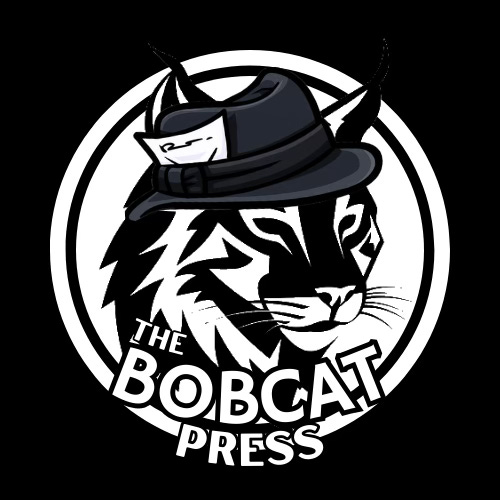“there was a huge crowd of people gathered in the streets” An EP Review + An Interview with Marble Teeth
A review of Marble Teeth's new EP + an inside look at his inspiration & process.
Marble Teeth has captivated me since the first time I happened across his set on Valentine's Day this year. It was a small house show put on by Off The Record Press with Goo Man Teeth, May5a, and Olive Half-drunk and overstimulated, I spent most of the night anxious, but still very pleased I came, spending time with friends and listening to the performers from the farther end of the room. That is, until I saw something that caught my eye: a small television. I made my way up to the crowd gathered around it and discovered a tall man standing in the center: Marble Teeth. As I joined the crowd, I heard him start to play an acoustic melody, and the TV lit up. From that point forward, in all honesty, I couldn’t tell you what the TV even had on it: I was too captivated by his performance to look away from him for one second.
After his performance, I spent the rest of the night…well, getting drunk. However, I knew that I needed to know more about this guy. So, when I found out that I had the opportunity to listen to his new EP, review it, and interview him, I knew I had to accept.
“there was a huge crowd of people gathered in the streets” — An EP Review
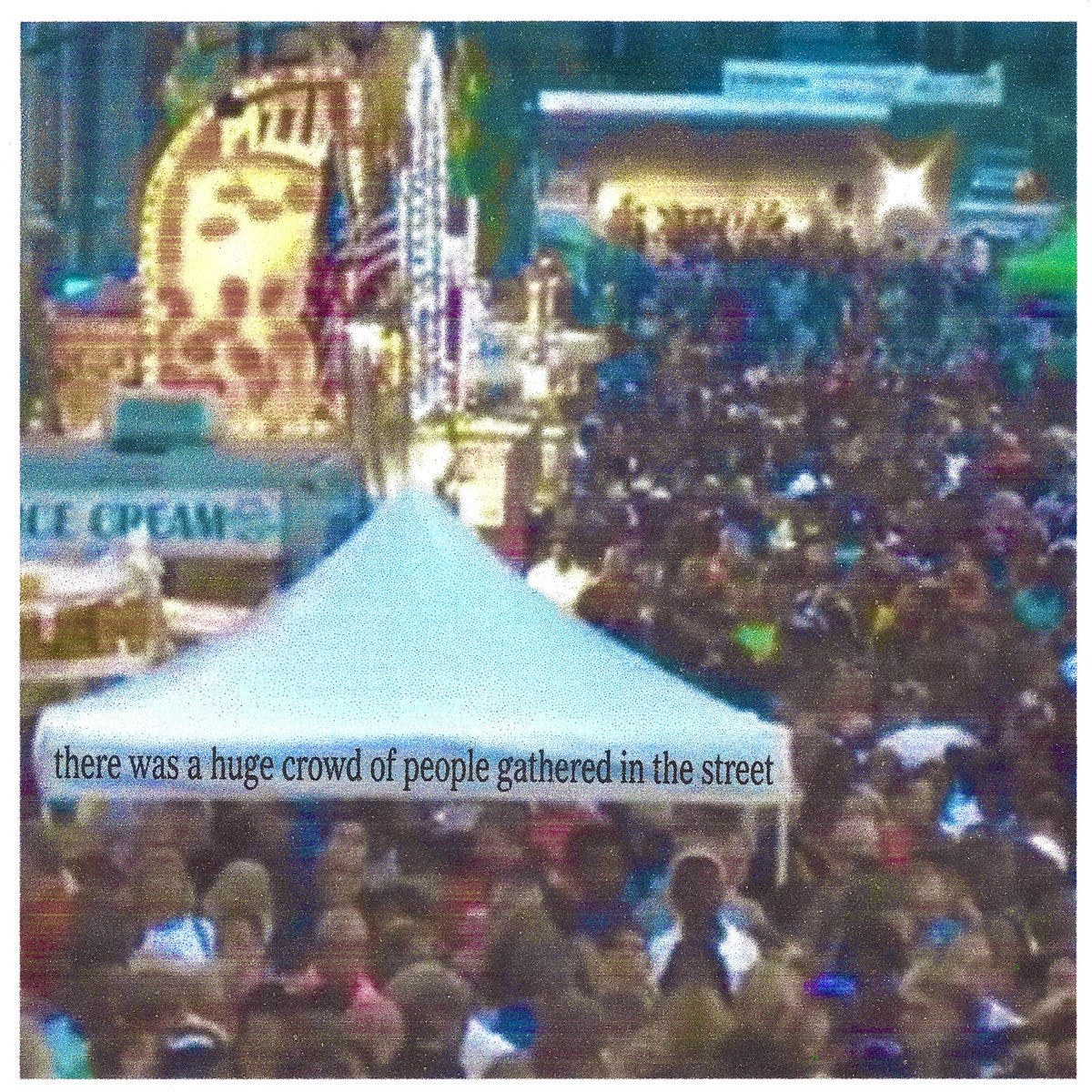
When he sent me the EP “there was a huge crowd of people gathered in the street,” I held off on listening to it in full until the night before our interview, making sure that it would be fresh on my mind—and boy, did I have some thoughts. This EP is astonishing. From short-form fiction to enthralling samples, to the distinct country-esque twang of the guitar, this work has something for everyone.
Starting with the first track, “Celebration Story,” the piece immediately invites the listener in with the voice of Tim, the neighbor of Caleb Jefson, otherwise known as Marble Teeth. The homely murmur of a crowd, paired with the gradually rising backing music, comforted me for a period before the music suddenly stopped. With nothing but the narration and the crowd, I was left with the story—a story of two men out on the town, judged by the masses at points but still enjoying the night. The music continues as suddenly as it stopped, this time with more intensity, until Marble Teeth’s haunting vocals take over—a far-away kind of singing, as though it were an echo. Ending in applause and a happy “I’m so glad we came” from one of the aforementioned men, it’s nearly impossible to stop listening.
Flowing seamlessly from the last track, “Power Bill Blues” is a vivid, yet drawling tune, leading with a harmonica and some gritty, lively guitar, before the vocals finally take over. It’s a contradictory piece—one with a happy sound and some frankly dispirited lyrics—one that makes you feel both uplifted and a bit sad. Personally, that’s exactly what I look for in my music, so it was an automatic 10/10 for that alone.
The third track, “Sudden Remembrance, Unfinished Business,” is a ballad of sorts—at least, with the lyrics. The same harmonica is featured here, this time with a xylophone or chimes of some kind, bringing the entire mood of this tale of heartbreak up. The drum is consistent and catchy throughout the entire piece, giving you something to really grasp on to as you’re taken through the assortment of different murmurs, chimes, and singing. However, this all goes out the window with the ending, which features tornado reports, harmonicas, computer noises, rambling from an unknown source, and so much more noise that each sound mixes together until it’s indistinguishable from the next sound. It’s a memorable song, for sure, but one that I’m not quite sure of the meaning of; and I think that’s the beauty of it, that there’s room open for interpretation.
The fourth track, “When the Water Broke the Dam,” is the shortest of them all, a quick little thing with the catchiest melody in the whole work. Seriously, you’ll find yourself humming “When the water broke the dam, did you sink or had you swam…” over and over again for days on end—I can speak from experience. This song feels like a lazy day in the sun, drinking the cheapest beer you can in a beat-up lawn chair. I mean this in an exceedingly positive way; this track fucking rocks. There is no room for improvement.
Finally, the last track, “Big Glass… The Lousy Lifetime of a Lowly Cog (icantseemyfaceinthemirror)” is a working man’s song—the perfect down-to-earth ending for this elaborate tale. The bare bones intro immediately draws you in, before you’re suddenly catapulted into a sort of rageful wailing. Paired with the inclusion of the jaunty violin, the energy becomes palpable. These characteristics are just as captivating as the intro, as you suddenly find yourself holding onto every word, every sound, every pause. The meaning of this track is clear: “It don’t feel too fulfilling to just take orders and then fulfill them; the lousy lifetime of a lowly cog,” and “I can’t see my face in the mirror.” These are messages many of us can relate to and ones that sum up the melancholy of this EP. Again, this is the perfect ending for this work.
This EP truly is a work of art, and I highly recommend it to anybody who’ll listen. After hearing it, I was immediately much more excited to speak with Caleb, wanting to understand the work and the man behind it. I sat down with him at Drop Soda Vintage Market’s 1 Year Extravaganza at The Garage—specifically, on their patio—to discuss all things Marble Teeth; so sit back, relax, and read on to learn more about this amazing musician!
An Interview with Marble Teeth
[Originally Recorded June 13th, 2025]

The Basics
When did you first, like, start getting into making music? Like, what inspired you to start making music?
Caleb: Um, just being a music fan, I guess. Like, as a kid I always had a big emotional connection with, like, just listening to songs. We had an event called the Decatur Celebration that was, like, a free street fair that was pretty big for how big our town was, and they would always have, like—for the longest time it was free, the last couple it was a ticketed event, kind of [thing]. But you could just wander around and see some washed-up legacy acts and then, like, just local people who are…you've never heard of them, but they're just killing it. And definitely just seeing events like that, I was always super inspired to want to play music and do that as much as I could. So, yeah, once I got to high school and I had a little more technology that I owned, I could piece it all together. And probably late high school would have been when I started recording my own songs and stuff.
Were you involved in any music stuff beforehand? Like band or anything like that?
Caleb: I played the saxophone [in] middle school bands. But I—honestly—none of that really has stuck with me, so I can't really read sheet music or anything.
Amaia: Yeah, yeah.
Caleb: It was…I was definitely not, like, obsessed with that style of music. Looking back, I wish I would have paid it more attention, just because that would be helpful to know and being really good at the saxophone would be fun; but when I come back to it now, I pretty much have middle schooler skills still. I haven't, like, progressed or tried to pursue that at all.
Amaia: Yeah, I feel you. I did chorus all through middle school and I cannot sing worth a shit.
Caleb: Really? I did, yeah, some choirs and stuff too. Our park district had a, uh, program over every winter. They would do a musical and then perform it in the spring and I did that for like 10 years probably. And more than just actually loving musicals, it was a good way to make friends and get to hang out. I mean, it was all music and performing; and theater is this whole other thing that I don't really do much of now, but it's very fun.
Amaia: Yeah, I also did a lot of theater growing up.
Caleb: Okay, nice. Yeah, it's just, like, getting to pretend. Looking back on it now as an adult, I took that for granted too. It's something you don't really get unless you're seeking it out. Like, that was just something I would do every year, but I haven't been in a play since I was in high school.
Amaia: Me neither.
Caleb: Something I've thought about is, like, people do DIY musicals all the time—and this definitely is a thing—but DIY musicals; like, either writing your own one or just putting it on in a really ramshackle type way is something that would be cool. I'd be open to collabing if anyone's got a musical they're trying to get done.
Amaia: That would be fucking awesome. Your style, I think, would be good for it. I love how you use- especially in this last EP, like, your use of samples and everything. I feel like that would transfer very well.
Caleb: Yeah, I definitely was trying to go a little more, like, soundscape, like, um, like-audio drama almost with certain parts of it for sure.
Amaia: Were those samples, by the way, or was that your own voice? I really couldn't tell.
Caleb: Which part?
Amaia: Uh, for the first song.
Caleb: That is. Some of it is just, like, crowd noise I pulled off the internet, and then some of it is my voice and other recordings I've dug up. And then my neighbor Tim actually read the story, and that's a story I wrote a couple of years ago that is actually about the Decatur Celebration.
Amaia: That's really cool.
Caleb: It's like, yeah, going and seeing bands and people watching and just, you can get a lot out of that. You're open to whatever.

Inspirations, Identity, & the Future
Would you say that those are some of your main inspirations: people watching or observing people? Or do you have any other inspirations in terms of what makes you want to do the music?
Caleb: Definitely. That's where I've been pulling from a lot more recently, I feel like [I’m] trying to just get more of the human experience captured in a song rather than just, like, “These are my specific emotions at any given time.” It's more “slice of life” for something that maybe doesn't necessarily directly apply to me, but you can kind of assign your own meaning to it and get whatever you get out of it. I like that for other things where it's, like, a little less nondescript and you kind of imagine your whole own world for it rather than them just giving it to you straight. You kind of use a little bit of your creativity on it; or maybe that's just something I do with things.
Amaia: I think it's cool. In general, your style is very interesting to me. I saw you perform for the Valentine's Day show. It was a house show and it was put on by a magazine.
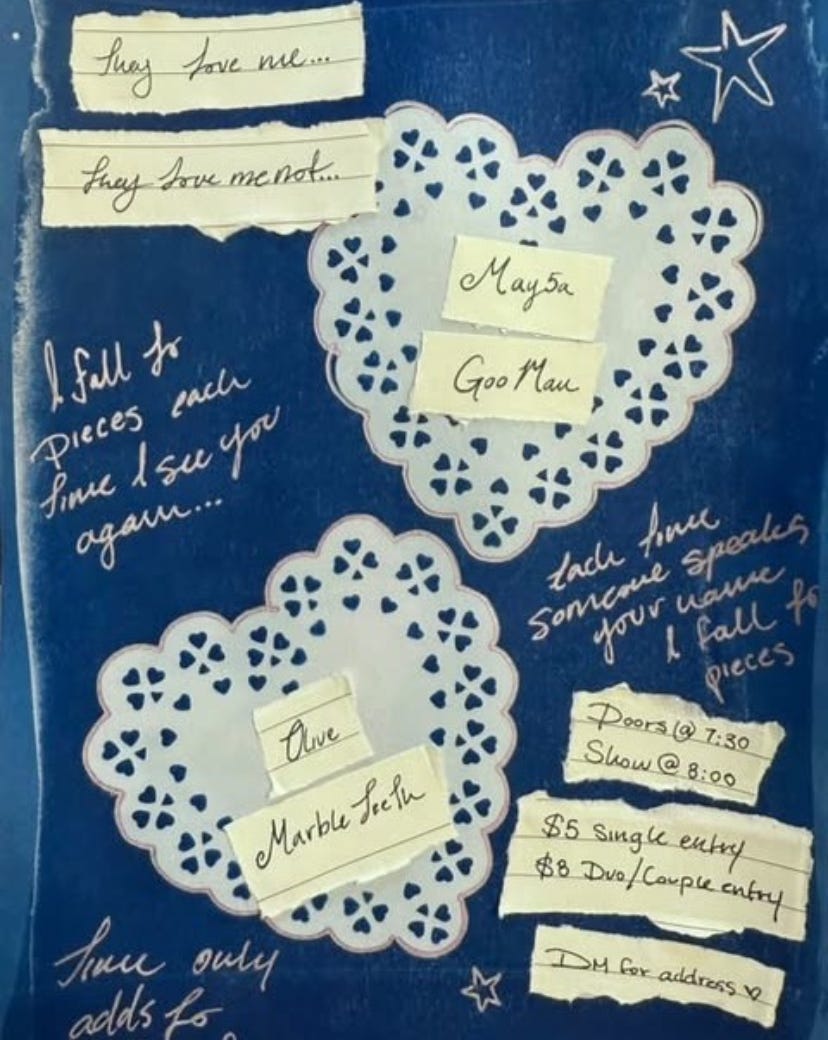
Caleb: Oh, okay. Oh, nice.
Amaia: Yeah. And your performance was great. Like, you used a television with it, didn't you, right?
Caleb: Yeah, yeah. Yeah, that's been something I've been doing for the past couple [of] years, and it's definitely the bread and butter for the house show type environment kind of thing. Like, it works really well when everyone quiets down and you can just cozy up and listen a little. I've got, like, a full band that I play with as well that—some of them are on some of the recordings. Most of the recordings are just me playing, but it's fun to kind of have the option. That one [show] I knew was going to be a house and, like, Valentine's Day [is] a little chiller. I don't bring the band to kind of chiller shows, but if it's, like, a bigger venue then...I've definitely played places with the TV that were a little too big to be doing them, and it just doesn't really work out the same way.
Amaia: Yeah.
Caleb: It can still be a good experience, but it's, like—[for a] house show, normally, I'm, like, yeah, I would prefer to do that with the TV sometimes.
Amaia: Yeah. I thought it was really cool.
Caleb: Thank you. Yeah, it's kind of been a labor of love for a couple [of] years, just figuring it out. I've had a couple [of] different discs over the years, but I think that's the same TV. Fall of 2018, I think, was the first time I did that. So it's been a while, and I have not used it, and then I’ll use it sometimes, but I've been in a little swing of using it again recently, for sure.
This [question] kind of goes back a little bit to what we were talking about with, like, what you like to do in your music, your kind of experimentation, and stuff like that: how would you describe your style in general? Do you like to put yourself in a genre, or do you like to kind of leave yourself unlabeled in that regard?
Caleb: I've never really been able to come up with something that feels super right. When I was doing acoustic a lot of the time, I called it just bedroom folk, because I was kind of, like…I had a big... When I started the project, I was very, like, bedroom pop, with that kind of, like, a little more spacey production.
I was listening to a lot of stuff like that, so I was trying to incorporate it, but now I'm listening to a lot more just, like, strictly folk and kind of old country blues and stuff. So it's evolving a little bit. I call it...I mean, Americana is, like, a very wide blanket you could put stuff under...I think I pull from a little more than just that. I don't know. Yeah. I would want someone to just listen to it and kind of…Just see what they think, I guess.
Amaia: Yeah. I think that you have a very unique sound, and it is hard to kind of pin down. I get what you mean about the “Americana” [label] and kind of, like, going more into the, like, country type [sound]. Yeah, I liked it a lot. With this past EP, definitely, I could hear that.
Caleb: Yeah, yeah. That was a group of songs specifically that all kind of sound...they sounded alike, I guess, in my mind, so I bunched those together. And there's more that are like that, and there's more that aren't like that, that are kind of in the chamber; but I'm going to try and just dump some EPs out over the next couple of years, hopefully—little groupings and stuff.
Amaia: That's really cool. I love EPs.
Caleb: Okay, that's good to hear.
Amaia: I love them so much. Like, I feel like...I honestly love them more than albums, typically.
Caleb: That's fair. I guess I always thought of myself as an album person, but recently…I mean, sometimes you just don't have the time, or it's like all of our attention spans are getting shot by various things, so I'll find myself skipping around more often than normal. I need to look out for some great EPs, I guess, just so I can digest them all at once.
Amaia: Yeah, it's...I kind of like...I don't know. I like [that] they’re shorter form, but I also just kind of like how they feel more intimate, generally. Like, a lot of EPs are less produced, which I appreciate a lot.
Caleb: Yeah, that's fair. Yeah, totally. That makes sense.
Amaia: Yeah.
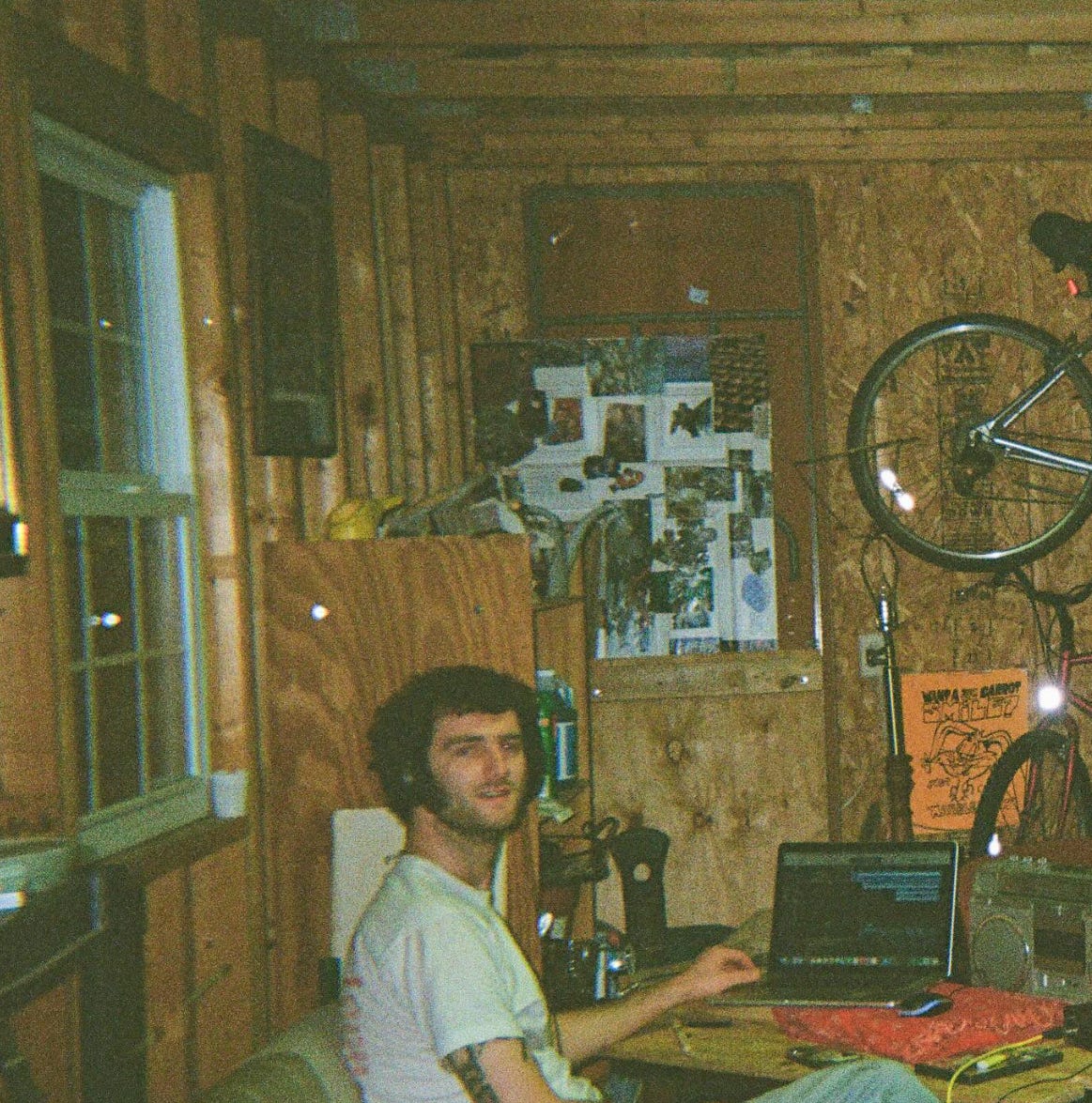
I know that you kind of just said that you wanted to do more EPs over the years, and kind of release more and more. What are your overall goals for Marble Teeth? Like, do you have anything that you're aiming for that you want us to know about?
Caleb: I mean, growing the reach is always great. And I feel like it's kind of...each release seems to pick up a couple [of] new people, generally. I feel like that's just how it goes; like, putting something out. People kind of blast it out for a little bit there, at least listening to it a lot, and it's fresh on their mind, so…I feel pretty content in the way that I've been releasing—self-releasing and recording—for the past couple of years, so I'm not really on anybody's timeline where it's like a label is expecting something, or it's like “It’s too soon to put something else out!” like, “You already did something!” It's pretty fun to just kind of get to operate in your own lane. And [I] definitely would always love the shows to get bigger and the stream count to get higher, but it's like...I'm very content…and yeah, the opportunities I've been blessed with so far because I'm playing pretty consistently…I'm not necessarily trying to book all those myself. I'm just like—I'm getting booked around Central Illinois without having to grind super hard at that anymore. So yeah, I just keep making new stuff and trying to travel a lot. That's always something that's been kind of integral to the process, is getting out and testing stuff on the road, and just hearing bands from other areas—getting to see what other scenes are like, and stuff.
That was actually one of my main questions that I had written down. It was about the influence of other scenes and travel on your music, kind of how that impacts your process, basically. I know you just said, but is there anything else that you'd want to go into about that with travel?
Caleb: Yeah, I mean, the majority of the first shows that I played as Marble Teeth, at least— I had been in other bands. We played Decatur a lot, and the surrounding areas a lot and on tour a little bit. We toured a little—but with Marble Teeth, I played maybe a handful of shows in town, but the majority of the stuff I was doing was…I would book a tour and just go on that solo by myself. I felt like most of the fans I had at the beginning were from Pennsylvania and Texas or something. It was kind of good motivation to keep trying to get out there and see everybody. Kansas City was a place I played a ton, just because I made so many friends there every time I played. St. Louis as well. Yeah, and [I’d] kind of just make that a routine to try and hit these places where I'm making friends as much as I could. I don't do it quite as much anymore, but [from] 2018 to 2020, it was every other month [that I was] trying to at least do a weekend of stuff out of state, out of town.
Amaia: That's awesome. I saw that you have some things planned for this summer as well. You have the show in Bowling Green—that's going to be cool!
Caleb: That's far, yeah. Do you know Equipment—the band Equipment?
Amaia: I don't.
Caleb: Okay, that's who I'm playing with. They're from there. I think they kind of live in other places now. Well, members of that band I actually met in a Front Bottoms Facebook group a long time ago. That was actually a way that I kind of had contacts to play out of state. I was a part of this Front Bottoms Facebook community where I was doing my own stuff, and then [I] could just kind of post in there and be like, “Where's everybody from? Can I come through?” Or at least maybe they would have a friend who was in a band or something and could send me in the right direction. So some of those [people] are definitely still people that I see to this day and will use as contacts for gigs.
Amaia: That's awesome. I have a whole bunch of random internet friends from, like, in the sixth grade.
Caleb: Okay, wow. I don't know if [there’s] anyone from that young for me, but I definitely remember, like, that era of just meeting people and chatting online constantly with people. Yeah.

So we talked about your EP and what your inspirations are for that, and a little bit about how you're using different stories and different soundscapes and that kind of thing, but what are your main inspirations for this project specifically?
Caleb: When I started…well, I mean, in early high school I was very into emo and pop punk and stuff, so there will probably always be a little bit of that in whatever I do, just because that's what I was listening to when I first started writing music, so that's, like, my first instinct sometimes. I got really into Slaughter Beach Dog, which is a Modern Baseball project that I really love to this day—it's, like, a great band. And then, I mean, the stuff they listed as influences…I was getting into Bob Dylan and James Taylor at the time, so, like, a little more '60s to'70s West Coast Americana stuff.
[I’m] trying to think…more recently I went through a big Alex G phase over the beginning of COVID. That kind of made me fall in love with a little “rougher around the edges” production. Some of his early albums are pretty noisy and unconventional sounding—like the guitar isn't, like, a beautiful clean guitar—but something about the character to it just. like, makes it super good. Yeah…and then recently a lot of, like, older bluegrass folk and blues stuff, like the “Anthology of American Folk Music” is a great place to start if you're trying to get into that. [It’s] just, like, field recordings from people from all over Appalachia in the South and stuff—just cool sounds on there; like, very interesting voices and delivery and just…structures of songs you've never really heard before. Like, they don't really follow the whole verse-chorus thing here.
Amaia: I love Appalachian folk so much, yeah. Decatur is in like the foothills of Appalachia—like Decatur, Alabama—[where I was] born and raised. That's so cool, yeah… it's—it's amazing; I mean, it's awful in a lot of ways, but I love it.
Caleb: Appalachia…yeah it definitely…yeah, I mean, it’s just like anything, any place I guess has its problems.
(CAR SPEEDS BY LOUDLY)
Caleb: Geez, oh god. Gotta be safe in these slick conditions.
Amaia: Someone just crashes into the building in the middle of the interview (laughing)
Caleb: Actually, I was playing a show in Milwaukee one time and someone crashed into the porch of the house in a car; and it was a big, like, apartment building, so it wasn't the porch of our house, but we could just see the cop lights outside. We were like “That looks really close. I wonder if they're busting the show?” We looked out and there was just a car on the sidewalk. We didn't even hear it crash or anything.
Amaia: Please (laughing).
Caleb: It was crazy, yeah.
Amaia: That's a good story, though.
Caleb: Yeah, yeah. It was…that was, like, on a pretty early trip. So, yeah, I was like “This is crazy!”
Would you say that's one of your funniest or best show stories, or is there anything else that you want to share?
Caleb: Uh…I would have to think (long pause). I guess definitely that one [was] maybe the wackiest, yeah. Like, I mean, my best wishes to the people involved in the accident, but we were all just like…we didn't even hear it happen, we just saw the lights, kind of; then we all just went back inside and kept the show going. [Then we] kind of like went outside to see what was going on. What else do you do?
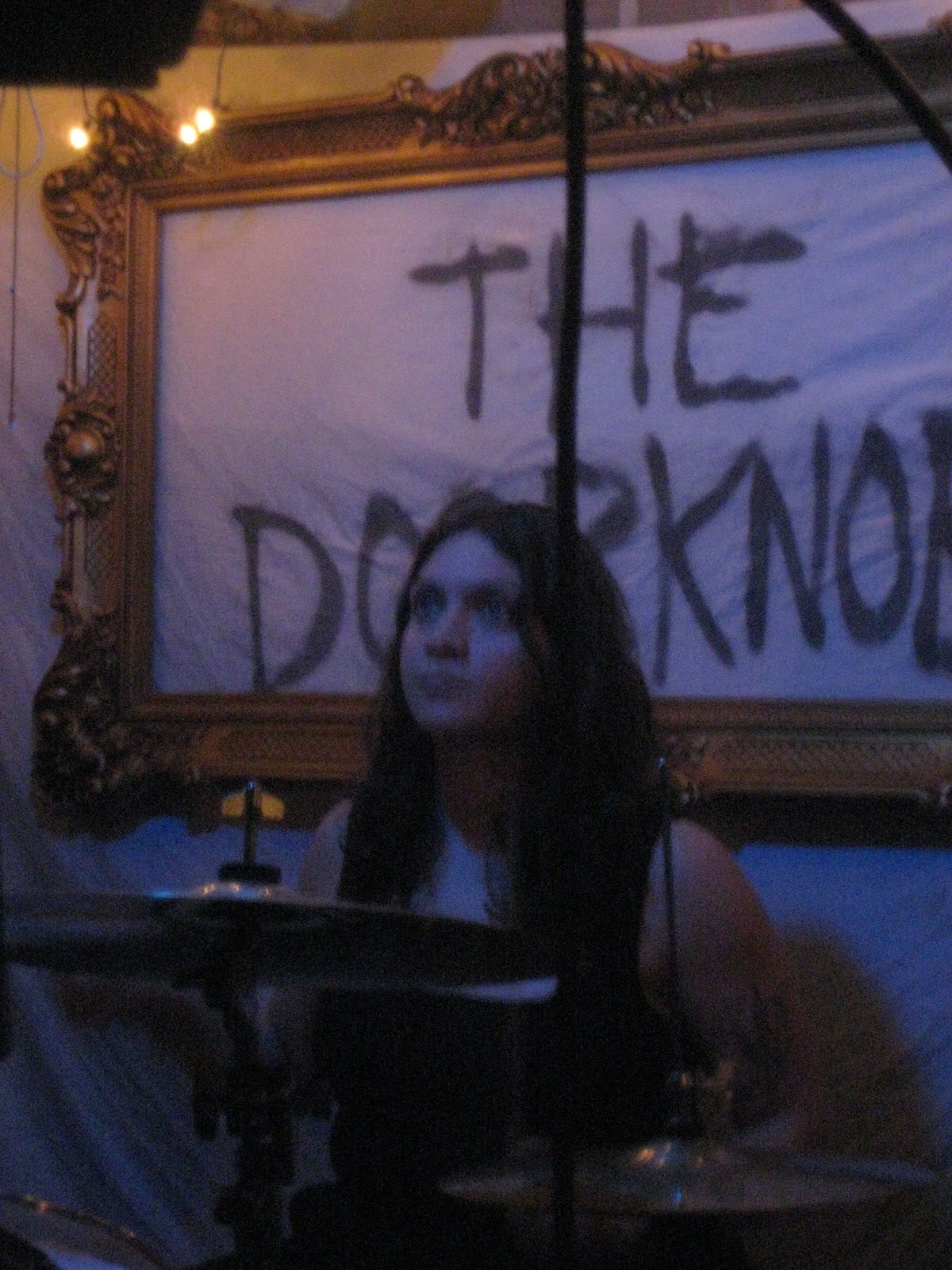
The EP: Behind the Scenes
All right. So, talking about your EP still a little bit—and I'm sorry that I'm jumping all over the place when it comes to the questions, I'm a little scatterbrained today—what was the making of it like? Is there any behind-the-scenes knowledge that you'd want people to know about that went into the production of this?
Caleb: I recorded it in my garage, pretty much—similar to all the other stuff I've done, if you followed along. It's just, like, straight into GarageBand, and my computer’s got, like, a little interface, and, um, yeah, I was experimenting a little bit [with] the last album—like, full-length album I did. [With] “top 10 times i've cried” I spent like a ton of time EQ-ing—just really getting into the nitty-gritty of trying to make certain parts of it sound pretty hi-fi, and that just took a really long time. And I was trying to jump over that a little bit this time by just, like, getting it down, listening to it a couple [of] times and then trusting my ear; going through it a couple [of] times, making some notes, and then, like, fixing what I thought needed to be fixed, and listening to it again, and then moving on to something else.
I played everything on this one (“top 10 times i’ve cried”), but I have more people playing on it (“there was a huge crowd of people gathered in the street”) than I have before…Um, my friend Jacob who plays in the live band plays some violin and mandolin on it, Tim did, like, the narration for the story at the beginning—he's my neighbor—and then my buddy Ryan Tuohy, who's in a band called Wide Orbit, did a guitar solo on a song. I have recorded with other people before, but [I’ve] never had this many people on something before, so it's fun to, like…[in] almost every song, there's at least somebody [else] playing one other thing on there.
Amaia: That's awesome—that's really cool
Caleb: I like it. Yeah, it's fun to—fun to get other people in on it.
Is there anything that I haven't covered that you want to be in this interview?
Caleb: Basically, no. I mean, I think that [I’m] just, like, gonna keep doing more of the same. I was trying to make this one sound a little more “live”—I kind of…I wanted to get the live band that I'm playing with right now to just track it all live, but I need to figure out how to get that many channels going to, like, make it actually sound that good; so that's definitely something in the future I'd like to do a little more. It just sounds like us playing—and that's the recording—but I was kind of going for that sound on this one.
The title track kind of story is really what I'm, like, most excited to share. That was the—just, like, doing an audio kind of storytelling. That was something I really hadn't tried before, and I would love to do more of that, I loved it. I was going back and forth between that being first, [because] either people will be, like, all in after that, or it's like they don't even hear the other songs because they're like “Alright, I'm just turning this off now. This is not what I thought it was going to be.” But I think it's short and sweet enough…I know that's why I got the background sound and all that stuff—I really tried to make it like an event rather than just, like, somebody reading something.
I went through a couple [of] different phases of that one (the title track) for sure; and then I actually put an ad out on Facebook Marketplace because I was trying to get a voice actor or somebody—just, like, somebody else's voice. I did it with mine, and then I didn't really like it, and then I pitched it down, and I liked that for a little while. Then, I had been spending some time with my neighbor, having some conversations that I thought were cool, and he has a great voice; so, I was like “Yeah, would you want to come over and read this?” and he did! And then [he] just, like, told me a ton more stories, and I recorded all of that. Honestly, too, he just, like, talked to me for an hour after he was done with the story, and I had all that on tape, so I'd love to do something with that. He was talking—he was like “I've wanted to—” or “Somebody has told me I need to write a memoir for my grandkids!” or something like that, so I hope he's inspired, and I'd do the audiobook for him if he wants to. That would be so cool.

If there’s one thing I hope you’ve learned from this interview, it’s that Marble Teeth has talent—and not just run-of-the-mill talent. Marble Teeth knows how to capture an individual and an audience, and that’s a rare trait. You absolutely must listen to his new EP, and make sure to check out Marble Teeth on Instagram and on all streaming platforms! You certainly won’t regret it.
Thank you for reading another piece from The Bobcat Press! Come back next week for another interview with some awesome St. Louis musicians, and keep your eyes peeled for some exciting announcements from the team!




